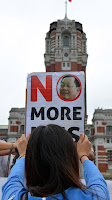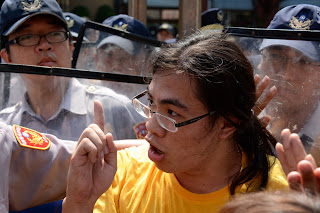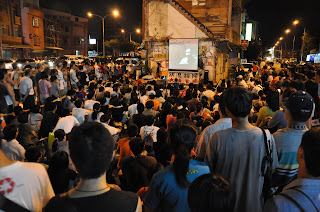Thuggish local officials, an unresponsive central government and the exploitation of the weak are creating an unstable brew of anger across Taiwan
We all knew it was going to happen eventually, that efforts over three years by residents and their supporters, lawyers, journalists and academics to prevent a local government thug from destroying their homes would likely fail, but when the outrage was actually perpetrated on Thursday, the cold, hard reality hit home. On that day, as hundreds of people protested in front of the Presidential Office, the bulldozers rolled in and razed people’s homes in Dapu (大埔), Miaoli County, pulverizing wood, concrete, dreams, lives lived, memories — and faith in people’s ability to rectify government abuse through legal and peaceful processes.
More and more, Taiwanese are realizing that harsher, perhaps more extreme measures will be needed to unhinge a government that makes a travesty of democracy and rule of law while enriching itself and its cronies at the expense of ordinary citizens.
 |
| Protesters in front of the Presidential Office |
I observed the latest round of protests on Ketagalan Boulevard against what can only be described as the criminal behavior of Miaoli County Commissioner Liu Cheng-hung (劉政鴻). The emotions, supercharged with the knowledge of what was happening at the same time down in Dapu, were palpable, and as expected, after a few speeches by activists and academics, clashes erupted, with waves of people rushing towards the Presidential Office, while rows of police officers pushed back with their shields. In the melee, Peng Hsiu-chun (彭秀春), whose house was among those being demolished, turned up, her face strained by emotions, sadness, and despair. “My home! They are destroying my home!” she said of an act that her husband, Chang Sen-wen (張森文), his mental state obliterated by recent developments, has to this day been kept secret from him. As the clashes continued, Peng was pushed by a police shield and collapsed to the ground, where she lost consciousness. Medics were sent to the scene, where they stabilized her neck, put her on a gurney, and spirited her away in an ambulance, as the angry crowd looked on.
 |
| Mrs Peng is taken away |
Two large police buses then turned up, and the order was given for police to take the protesters away. The cops were also ordered to create a ring around the protesters and to keep journalists at bay. I circled round the scene as activists were forcefully shoved into the buses, frustrated at my inability to take good pictures of the action — a feeling that was shared among most photographers on the scene, who loudly voiced their complaints.
Then, just as one bus, its hull pregnant with dozens of protesters, was about to take off, I attempted to take one last picture of it (a female protester had managed to lodge herself against the front window) when a police officer used his shield to shove me away. He pushed so hard that my feet left the ground momentarily, but I managed to remain in position to take the shot. He approached me again and told me to bug off. “I’m a reporter,” I replied. “I’m doing my job.” It had the opposite effect. He turned on me and screamed, in English: “This is not your country! This is China, you have no business here!”
 |
| Activists are taken away |
Now, to be fair, I cannot say with 100% certitude that he said
China, as
his accent was rather thick and there was a lot of noise, but immediately after this, a Taiwanese protester joined us and bellowed: “This is not China, this is Taiwan!” Whereupon the cop repeated his insult, this time making sure that this was
not my country, that this was
Taiwan. Correction notwithstanding, I had just been told by a police officer that foreign reporters had no business covering such developments, and as readers can very well imagine, this writer, who regards his work as a responsibility, did not appreciate his views at all. Since he’d chosen to speak English to me, I summoned the Bard and responded in such a voice that must have been heard all the way inside the Presidential Office. “I’m doing my work,” I hollered, following him around and repeating myself, my words punctuated by a few unprintable expletives. A senior — and rather friendlier — officer from the CID then intervened and quieted things down. I repeated to him what the cop had said to me, and the CID officer admitted that the junior cop shouldn’t have said that. “But you were standing in front of that bus,” he said. Fair enough, I replied, and we parted amicably, though deep inside I knew that journalists and photographers did what I did all the time. I thanked him and patted him on the shoulder (always keep allies in the ranks). Soon afterwards, a Taiwanese protester came over and nodded in the direction of a plainclothes police officer standing nearby. “Be careful, he’s watching you,” he murmured.
Update: I had initially referred to the cop as being young, but I ran into him again at the protest in front of MND on Saturday morning, and realized that he is rather senior, with two lines and three stars. In other words, he really should have known better.
More protesters were shoved into a bus, and once again it was impossible for journalists to get close enough to the action. One, who had briefly succeeded in breaking through the line, was soon expelled, whereupon he launched himself into a series of colorful expletives.
The protest, which had lasted about one hour, wrapped up, and we all dispersed. Activists on the bus say they weren’t told where they were being taken, and decided to call the authorities to inform them that they had been kidnapped. Police eventually dropped them off near Sun Yat-Sen Memorial Hall.
By then, the homes in Dapu were no more. Under Liu’s orders, crew had moved in even before the residents could take all their personal belongings out. In fact, the residents were not even given enough time to pray to the land god before the workers demolished their homes, which according to Taiwanese beliefs will bring bad luck, as if they didn’t have enough of that already. Workers took out fridges and TV sets, but almost everything else — clothes, jewelry, money, photo albums — went down with the buildings, only to be dumped into a field nearby. Appearing on a talk show on FTV the following night, Peng, a sweet, humble woman who never asked to be forced onto the national scene, tearfully showed some of her clothes, covered in mud, ruined. She also displayed what was left of her wedding photo albums. Her wedding ring was somewhere in that field, under piles of debris, which continued to accumulate as city workers kept dumping stuff there. Images of their son sifting through the rubble, looking for their belongings, were heartbreaking.
Update: On Saturday at noon, an order was issued for police to surround the dumping ground. It now seems that the Chang's personal belongings are being held hostage by the county government. Might it be because of the series of absolutely heart-rending pictures we have seem coming out of that field since last night, as the family and friends look for their cherished items? Or a personal vendetta to make the family suffer for daring to oppose Liu?
As academics had said at the protest and are now saying on talk shows, citizens had used all legal and peaceful means over three years, all means of suasion, had been given promises by then premier and now Vice President Wu Den-yih (吳敦義), only for the crime to be perpetrated anyway. The inaction of the Democratic Progressive Party (DPP), which has contented itself with playing the role of opposition party, and the silence of Chinese Nationalist Party (KMT) legislators, has also left activists disillusioned and desperate. It is no wonder that we are increasingly hearing calls for revolution, disobedience, guerrilla tactics, and more direct action. Or warnings to Liu that he will be hounded wherever he goes, that he should have police parked in front of his house 24 hours a day. The commissioner and his backers in Taipei have pushed people to the limit of their patience, and made it evident that traditional approaches, based on rule of law and reasoning, are failing — over Dapu, and over many other issues.
 |
| In front of KMT headquarters |
So on Thursday night, Yang Ju-man (楊儒門), better known as the “Rice Bomber,” re-emerged and joined the cause by lobbing a paint bomb at the Presidential Office. The following morning, student activist Chen Wei-ting (陳為廷), better known for his role as a leader of the anti-media monopolization movement, visited one of Liu’s five homes in Miaoli (Chen himself is from there) and threw paint at it, before he was overpowered by police and taken away. Later that day, protesters gathered in front of the KMT headquarters building in Taipei, carrying pictures of old KMT revolutionaries and holding a press conference before throwing eggs at the building, prompting brief clashes with police and more muscular pain for this writer, who at one point was sandwiched between a concrete wall and a bulky police officer who was fighting off a protester. Ma Ying-jeou’s (馬英九) campaign office (he’s running against only himself for the KMT chairmanship on Saturday in what is expected to be a very close race) was also heavily egged, and pig feces were thrown while he was on a visit on Chiayi. For his part, Wu was heckled by protesters during an event in Taipei. More and more, people from the inside are providing activists with the itineraries of government officials, which includes the Central News Agency (CNA) list of all government activities, known as the daily
guo nei. CNA sends the list to news organizations every night at about 9:30.
 |
| Eggs fly |
Just before the eggs started flying at the center of KMT power, Li An-cih, one of the activists who spoke during the press conference, quoted words by Japanese novelist Murakami Haruki which he had issued upon receiving the Jerusalem Prize for the Freedom of the Individual in Society in 2009:
"Between a high, solid wall and an egg that breaks against it, I will always stand on the side of the egg."
 |
| Loud and clear |
It takes a lot to push Taiwanese to take non-peaceful measures, but from everything that has happened in recent months, and with the crime of Dapu perhaps serving as a catalyst, I believe we may soon cross a line where more direct — perhaps even violent — action will be taken. It’s always easy to regard individuals like the Rice Bomber as extremists, terrorists even, but how can we not agree with their tactics when years of rational efforts, abiding by legal and democratic rules, are simply ignored by those in power, by crooks who undo the very fabric of Taiwan’s democracy in the process of seizing valuable land to fatten their bank accounts, perhaps in expectation of the day when Taiwan will relax its regulations on Chinese purchase of land here?
Things might get ugly, and the government will only have itself to blame for what happens next. (All pictures by the author.)















































